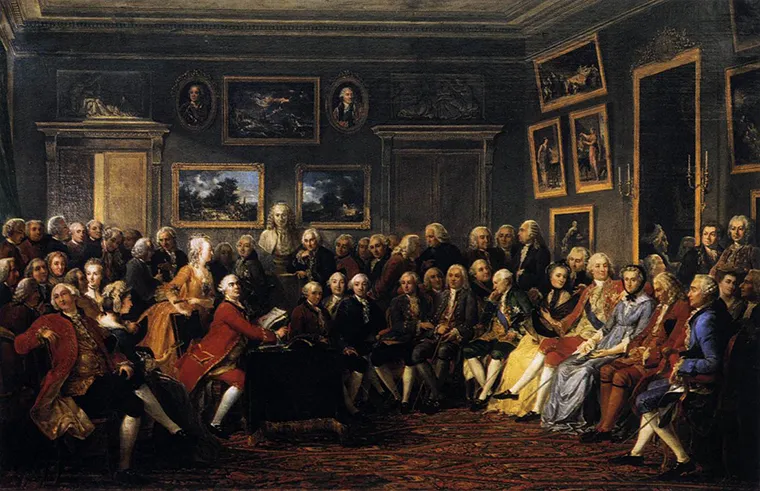What Is the Enlightenment and How Did It Transform Politics?
Explore how calls for liberty, equality, and individual rights caused revolutions around the world, from the American Revolution to the French and Haitian Revolutions.
In 1627, officials in Cologne, Germany, accused Katharina Henot—a local postmaster and influential socialite—of witchcraft. They claimed she wielded magic and worked with the devil. The officials even accused Henot of infesting a local nunnery with a plague of caterpillars. For these alleged crimes, she was repeatedly tortured and publicly executed.
While extraordinary by today’s standards, Henot’s case was alarmingly common for the time. Between 1520 and 1700, Europe executed tens of thousands of people—mostly women—on charges of witchcraft.
How did this happen? Surely anyone using science and reason could have deduced that such charges were ludicrous, right?
Then again, science and reason have not always prevailed.
For centuries, intellectual and political authority came from religion and other traditional beliefs. To understand the world—including phenomena such as plagues of caterpillars—people would turn to supernatural belief in witches or religious belief in Satan. To explain political systems—like why a particular family had absolute rule over a kingdom—leaders turned to religion, claiming a divine right from God.
But during this time, a series of religious, political, and scientific upheavals began challenging the status quo, culminating in the Enlightenment.
This resource explores the history of the Enlightenment and the radical ways in which Enlightenment ideas changed society for centuries to come.
What was the Enlightenment?
The Enlightenment was an intellectual movement in the seventeenth and eighteenth centuries that sought to improve society through fact-based reason and inquiry. The Enlightenment brought secular thought to Europe and reshaped the ways people understood issues such as liberty, equality, and individual rights. Today those ideas serve as the cornerstone of the world’s strongest democracies.
What events led to the Enlightenment?
Prior to the Enlightenment, the Catholic Church reigned supreme as Europe’s preeminent religious and intellectual leader. However, during the 1500s and 1600s, several events began to challenge its hold on power.
Let’s explore three of the most important historical developments:
Religious Reformation: In the year 1517, a German monk and professor of theology named Martin Luther pinned a list of ninety-five arguments, or theses, to the doors of a cathedral. Those theses accused the Catholic Church of corruption and abuse of power. Luther claimed that every individual possessed a connection with God and that the Church did not monopolize the path to salvation.
Luther’s action produced a split within the Catholic Church and encouraged individuals to challenge the institution’s previously unquestionable authority. Thanks to rising literacy rates and the invention of the printing press just decades prior, Luther’s message reached a wide audience. The Bible was now being printed in the vernacular, and people began reading it for themselves rather than having priests explain it to them.
Political Upheaval: Europe reached a state of near-constant conflict in the 1500s, as leaders fought over land, resources, and competing interpretations of Christianity. An entire century of religious wars culminated in one of history’s deadliest conflicts: The Thirty Years’ War (1618–48).
Two major consequences emerged from that conflict. First, the resulting peace helped establish the bedrock principle of international relations known as sovereignty—the concept that guarantees countries get to control what happens within their borders and prohibits meddling in another country’s domestic affairs. Second, it produced further criticism of the continent’s political and religious leaders after decades of combat had claimed millions of lives.
Scientific Revolution: In the early 1600s, English philosopher Francis Bacon revolutionized intellectual thought by demonstrating that scientific discovery could not be achieved through faith and religion but rather rigorous research and observation. His scientific method set the gold standard for future research. It also coincided with a wave of breakthroughs in the fields of astronomy, mathematics, and physics by scientists such as Galileo Galilei, Johannes Kepler, and Isaac Newton.
Although many of those intellectuals were devout Christians who believed that science and religion were easily reconcilable, religious authorities nonetheless viewed those discoveries as threats to their power. Officials, for instance, placed Galileo under house arrest for his writings on how the earth revolved around the sun, which undermined the teachings of the Catholic Church.
Despite protestations from the Church, this era—known as the Scientific Revolution—led to a flourishing of empirical thought in Europe.
How did the Enlightenment change society?
On the heels of the Scientific Revolution came the Enlightenment—a movement that sought to apply similar methods of inquiry and discovery to the fields of law, religion, economics, and politics. Enlightenment scholars believed that such thinking could produce societies that were more equitable, just, and not beholden to the unchecked power of monarchs and religious leaders.
Let’s explore five influential ideas that emerged from the Enlightenment in the seventeenth and eighteenth centuries:
Opposition to Absolute Monarchy: Intellectuals such as Jean-Jacques Rousseau and John Locke introduced the idea that no ruler should have unlimited power. Both argued that leaders derived their authority not from God but from the people. And Locke claimed that if the people opposed their leader, they had the right to replace their government with one that respected their rights.
Notably, few Enlightenment thinkers called for democracy as people understand the term today. Many intellectuals such as Voltaire believed that monarchy was the best way to advance social, political, and economic goals. However, the idea that citizens could hold their leaders accountable was revolutionary.
Separation of Powers: The Baron de Montesquieu argued that power should not be concentrated in just one person. Instead, he called for a balanced distribution of power between executive, legislative, and judicial authorities.
Enlightenment thinkers similarly called for a separation of church and state—the idea that government should not interfere in religious affairs, and vice versa. Writers such as Voltaire were highly critical of religion’s outsize influence in European policymaking, which had contributed to generations of conflict on the continent.
Liberty and Individual Rights: John Locke introduced the idea that all men possess natural rights to life, liberty, and property. Those rights, he argued, were inalienable, meaning they could not be taken away or constrained by law.
Calls for individual rights contributed to increased religious tolerance in Europe as various governments began providing religious minorities greater freedom to worship.
Equality: Pre-Enlightenment Europe was highly unequal, with powerful individuals known as the nobility possessing exclusive rights to own land, avoid taxes, and hold privileged jobs, while the poorest members of society struggled to survive. The Enlightenment challenged this arrangement, as thinkers like Locke argued that all men were created equal and that no one should be born into more power than another.
However, many intellectuals believed that such equality only applied to white men. Rousseau saw groups such as women, ethnic minorities, and enslaved people as inherently inferior to white men. Nevertheless, marginalized groups often used those same Enlightenment arguments to advance their own cases for equality. English thinkers such as Mary Astell and Mary Wollstonecraft wrote extensively in support of women’s access to the same rights and opportunities as men.
Free-Market Capitalism: Scottish economist Adam Smith railed against the era’s prevailing economic policies such as mercantilism, in which each country sought to produce as much as possible domestically and import as little as possible from abroad. Through careful observation and research, Smith came to introduce groundbreaking economic theories—including supply and demand, free-market capitalism, comparative advantage, and minimal regulations—arguing that countries become richer when they make what they are best at producing and import what they are not. Those ideas continue to form the backbone of international trade.
Where did the Enlightenment inspire revolution?
As Enlightenment texts spread across the Atlantic, their ideas inspired revolutions.
American Revolution: Political and intellectual leaders in Britain’s thirteen American colonies used Enlightenment values to justify their declaration of independence in 1776. Following the American Revolution, those Enlightenment principles—including liberty, equality, and individual rights—became enshrined in the U.S. Constitution, even though many rights were initially reserved mostly for landowning white men. It would take nearly a century for the United States to abolish the institution of slavery and several decades longer to extend the right to vote to women.
French Revolution: News of the United States’ Enlightenment-inspired revolution ricocheted around the world. In 1788, Thomas Jefferson—then the U.S. minister to France—wrote to George Washington, noting that France “has been awakened by our revolution, they feel their strength, they are enlightened, their lights are spreading, and they will not retrograde.” Indeed, the following year France experienced its own revolution, which ultimately toppled the country’s monarchy.
Haitian Revolution: In 1791, the inhabitants of France’s most profitable colony—Haiti, then known as Saint-Domingue—began demanding their own right to liberty and equality. Enslaved Haitians outnumbered slaveholders ten to one on the island. After a thirteen-year war, the Haitians defeated the French and established the first Black-led republic. European powers, however, did not immediately recognize Haiti as an independent country and instead forced Haiti to pay reparations to France over more than a hundred years.
Latin American Revolutions: In the early 1800s, Enlightenment-educated leaders such as Simón Bolívar led movements for independence in Bolivia, Colombia, Ecuador, Peru, and Venezuela. However, while revolutionaries pledged to eliminate the colonial era’s racial and social hierarchies, independence rarely brought about equality. Instead, leaders frequently perpetuated the same unequal, undemocratic systems that benefited the landowning elite.
Across Latin America—as in the United States, France, and Haiti—Enlightenment values began the march toward fairer and more equitable societies, but it would take generations for many countries to begin fully realizing those ideals.
Where do we see Enlightenment ideas today?
More than three centuries after John Locke wrote about the relationship between people and their government, the core tenets of his writing and those of his Enlightenment contemporaries continue to shape society. Many of the world’s strongest democracies, for example, actively support liberty, equality, and individual rights through their laws and norms.
But just as leaders did not universally accept Enlightenment ideas in Locke’s time, the same holds true today.
Many societies—above all, authoritarian countries—actively reject some or most of the Enlightenment’s founding principles. Governments in countries such as China, Egypt, Iran, North Korea, Russia, and Saudi Arabia quash civil liberties, oppose free and fair elections, reject perceived checks to their power, and—in certain instances—ignore separation of church and state.
Enlightenment ideas have even come under attack in democratic countries such as Brazil, Hungary, the Philippines, and Turkey. Leaders there have attempted to increase their power by undermining political freedoms and civil liberties in a trend known as democratic backsliding. As a result, the world has become less free and less democratic every year between 2005 and 2019.
The United States, as well, has long struggled to embrace all tenets of the Enlightenment. Inequality and systemic racism remain significant challenges, and sharp disparities persist in access to housing, wealth, education, and health care. Further, many in the United States dismiss facts and scientific inquiry; former President Donald J. Trump, for example, repeatedly sidelined top scientific experts while endorsing unproven COVID-19 medical treatments. And on January 6, 2021, the country’s free and fair elections came under direct assault when armed rioters—many with white supremacist ties—stormed the U.S. Capitol seeking to overturn the results of the presidential race.
Although trials for witchcraft are no longer a normal part of life around the world, many countries still have a long way to go before fully embodying the founding principles of the Enlightenment.



